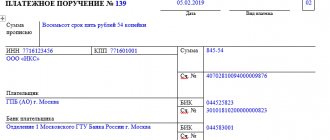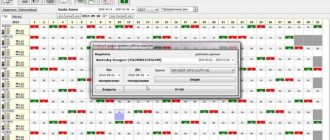What is the purpose of the job description?
When hiring a new employee or transferring an employee of an enterprise to a new position, he must be familiarized with the responsibilities that he will have to perform in his new position. This is necessary, first of all, in order to establish one of the main subjects for which an employment contract is concluded - the labor function of the employee.
A document called a job description serves this purpose. In terms of content, it turns out to be broader than a simple list of responsibilities, since it usually also includes determining the employee’s place in the hierarchy of the relevant department, listing the requirements for his level of qualifications, and also defines the rights associated with the performance of official functions and responsibilities.
The obligation to draw up a job description is not established by law, but in reality this document is needed for both the employer and the employee. It allows the employer to:
- clearly describe the responsibilities associated with a specific position;
- remove the problem of drawing up individual requirements when searching for a suitable candidate for a position;
- facilitate the process of introducing a new employee (or employees) to his job functions.
- control how well a particular person copes with the job;
- hold him accountable for failure to fulfill his official duties.
At the same time, the employer is interested in the fullest possible reflection in the instructions of the real functions performed by the employee, since the latter has the right to refuse to perform additional work and the right to demand additional payment for work that is not part of his duties.
All this, while not formally mandatory, makes the job description a very important and necessary document, the drafting of which should be approached with special care.
What is the position of deputy chief accountant?
The position of deputy chief accountant implies the presence in the organization of an employee who, at least in some matters, is able to replace the chief accountant who is temporarily absent for some reason. Most often these questions are:
- signing current documents;
- approval of ordinary documents;
- creation and transfer of current accounting information to related departments;
- resolution of urgent methodological and organizational internal situations;
- preparing clarifications on urgent external requests.
For information on filling out an order to replace an absent employee, read the article “Order to replace an absent employee during vacation - form and sample.”
In addition, the deputy chief accountant is usually entrusted with the functions of monitoring compliance by accounting employees with the accounting rules established by the accounting policy, as well as that part of the current accounting work, which, as a rule, is associated with the most complex areas of accounting and tax accounting.
All this assumes that the deputy chief accountant has a sufficiently high level of professional training and experience. Therefore, in this part, the same requirements are imposed on him as on the chief accountant (clause 4 of article 7 of the law dated December 6, 2011 No. 402-FZ; professional standard “Accountant”, approved by order of the Ministry of Labor of the Russian Federation dated December 22, 2014 No. 1061n) :
- higher or secondary specialized education;
- work experience of at least 3 years out of the last 5 with appropriate professional education, and in its absence - at least 5 years out of the last 7;
- absence of outstanding convictions for crimes in the economic sphere.
Just like the chief accountant, his deputy belongs to the category of managers and therefore must meet the requirements for a manager capable of performing the functions of a chief accountant, with documents such as:
- qualification directory of positions of managers, specialists and other employees, approved by Resolution of the Ministry of Labor of the Russian Federation dated August 21, 1998 No. 37;
- professional standard “Accountant”, approved by order of the Ministry of Labor of the Russian Federation dated December 22, 2014 No. 1061n.
According to these documents, a specialist performing the work of a chief accountant must know:
- accounting and tax legislation;
- civil, financial and economic legislation;
- labor law;
- codes of ethics for professional accountants and corporate governance;
- statistical and management accounting;
- specifics, technology, structure, strategy and prospects for the organization;
- rules for conducting audits;
- methods of financial analysis;
- accounting and reference legal databases.
The functions of the deputy, as a rule, will not include such issues as organizing the work of the accounting department and document flow in terms of receipt of the necessary primary documents, developing accounting and tax policies, financial analysis, but he must be aware of all the organizational and methodological aspects of the work of the accounting department in order be able to exercise ongoing control and, if necessary, replace the chief accountant.
Read about what you need to keep in mind when developing modern accounting policies in the material “Accounting Policies 2015–2016”.
What types of accountants are there? part 1
This article appeared as a reaction to messages from accounting forums. There you can often find novice accountants looking for answers to the questions: “I want to work as an accountant. What I need to know”, “What a novice accountant should know”, “Where to start studying accounting”. Judging by how many people ask them and how many are trying to help them by giving advice, it is clear that the question is relevant.
I am writing this article because I noticed a pattern in these messages and I cannot remain silent about it. I consider it very important because, in my opinion, it creates confusion in the councils. I'll try to explain now what I mean.
Let's start with the fact that when giving advice, people describe the knowledge and skills that an accountant should have. For example:
“...Laws change at the speed of light, and so does the chart of accounts. Accounting at a confectionery factory is completely different than at a car factory or, in general, at a state-owned enterprise..."
“...she must have a thorough knowledge of accounting and all reporting...”
“...At this stage, the accountant is engaged not only in accounting, but also in financial, management, and tax accounting...”
“...To work as a normal accountant, you must have a specialist. education. And constant self-education - everything changes every day..."
“...To become a good accountant or chief accountant you need to study a lot and constantly learn...”
Deputy function options
Depending on the characteristics of the structure of the organization whose employee is the deputy chief accountant, the following options for his functions are possible:
- The organization is part of a holding, and all chief accountants of the companies that form this holding report to the chief accountant and are called his deputies. At the same time, the deputy chief accountant of the holding essentially remains the chief accountant of his organization and performs all his functions in full.
- The deputy chief accountant is an employee of the large accounting department of a large enterprise. In this case, as already described above, he will, while performing part of the accounting work himself, monitor that the accounting department conducts its work in accordance with the requirements of the accounting policy established in the organization, sign part of the current primary documents and periodically replace the chief accountant during his absence. The duty of substitution for such a situation is usually included in the job functions of the deputy.
- In a small organization with a small accounting department, an employee can be appointed deputy chief accountant who performs his functions almost equally with the chief accountant in terms of approvals, signatures, and reporting. At the same time, organizational issues, methodology and accounting policies remain the prerogative of the chief accountant, and accounting work is divided evenly among everyone, including the chief accountant.
Thus, the scope of responsibilities of the deputy chief accountant in different organizations may vary significantly. Therefore, they must be clearly stated in the job description.
There are “different” accountants
Based on my practice, I will list the main ones:
- Accountant material desk
- Accountant cashier
- Accountant bank
- Accountant for mutual settlements
- Payroll Clerk
- Accountant for fixed assets
- Accountant on checkout
- VAT accountant
- Accountant for purchasing goods
- Chief accountant, putting together all accounting
Do all these options for “accountants” require the same amount of knowledge? Does each of them need to know everything related to accounting, for example:
- tax systems,
- filling out reports,
- ability to calculate salaries,
- name and rules for filling out all primary documents,
- knowledge of all accounting accounts and transactions,
- formation of balance,
- formation of a declaration,
- regulatory documents and laws on accounting/tax accounting?
- and etc.
Isn’t this all the knowledge implied in many pieces of advice? Is it possible for someone who has just embarked on the accounting path to do all this at once? Before I even started working!
Of course, not knowing anything at all is not an option either. It will be extremely difficult for such a specialist to both get a job and keep it, even in the role of an accountant in the simplest area of accounting. You will still have to know and be able to, either before employment or during work, you will urgently have to “obtain” knowledge and skills.
In addition to the names of accounting positions, the company itself can help us understand what a novice accountant needs to know. Read more
I recommend paying attention to these articles:
In the life of novice accountants, there are situations when, being without experience, they easily get a job. Was it by pure chance or was the stars aligned? A….
Today we can rightfully say that the accounting profession has become widespread. This is clear from the fact that almost any college, technical school or higher education institution teaches...
When choosing a future profession as an accountant, you should know what to prepare for in order to work as an accountant. I would like to find in advance the answer to the question “What types of accountants are there?”….
What should be included in the job description?
In its structure, the job description of the deputy chief accountant will not differ fundamentally from similar documents drawn up for other employees of the organization. Typically it includes the following sections:
- the employee’s position in the structure of the organization or division, his subordination;
- education and work experience requirements;
- list of job responsibilities;
- rights arising from official duties;
- responsibility.
The key section in the instructions is the list of job responsibilities, since all other points, with the exception of the rights granted in connection with the performance of duties, are enshrined in other documents (legislative acts or internal documents developed by the organization itself). And the rights reflected in the instructions logically follow from job functions.
When compiling a list of job responsibilities, it is necessary to proceed from the functions actually performed by the employee, reflecting their specific content and not limiting ourselves to general phrases. Otherwise, disagreements with the employee regarding the understanding of the responsibilities assigned to him will be inevitable.
There are “different” accountants
Based on my practice, I will list the main ones:
- Accountant material desk
- Accountant cashier
- Accountant bank
- Accountant for mutual settlements
- Payroll Clerk
- Accountant for fixed assets
- Accountant on checkout
- VAT accountant
- Accountant for purchasing goods
- Chief accountant, putting together all accounting
Do all these options for “accountants” require the same amount of knowledge? Does each of them need to know everything related to accounting, for example:
- tax systems,
- filling out reports,
- ability to calculate salaries,
- name and rules for filling out all primary documents,
- knowledge of all accounting accounts and transactions,
- formation of balance,
- formation of a declaration,
- regulatory documents and laws on accounting/tax accounting?
- and etc.
Isn’t this all the knowledge implied in many pieces of advice? Is it possible for someone who has just embarked on the accounting path to do all this at once? Before I even started working!
Of course, not knowing anything at all is not an option either.
How to write instructions?
The job description for the deputy chief accountant, just like for any other accounting employee, is developed by the chief accountant.
It does not have a legally approved form, so it is drawn up in accordance with the rules established for internal documents created in the organization. This can be a form developed independently or simply a form with the name of the organization. In any case, this document must be approved by the manager. If the document flow rules in force in the organization require preliminary approval of the text of the job description with other departments (for example, with the legal service or the human resources department), then before submitting it for signature to the manager, it is agreed upon in these departments.
Under the text of the instructions, the position, surname and signature of the developer are indicated, and a space is left to place a note indicating that the employee has familiarized himself with the document, which requires his signature and the date of familiarization.
It is recommended that a copy of the job description be provided to the employee.






